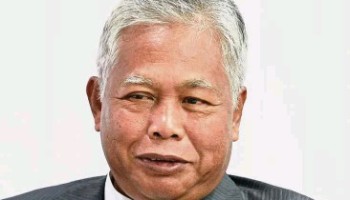The hidden costs, and the controversy, of the massive US global spying operation keep on growing.
IF officials behind the US-based “Five Eyes” spying network had
hoped the scandal would soon fade away, their obvious disappointment
should be an object lesson about their excesses and abuses.
US, British, Canadian, Australian and New Zealand spies – together
with their Singaporean and South Korean co-conspirators – had violated
the implicit trust placed in their governments by friendly and ally
nations around the world.
Former US intelligence contractor Edward Snowden had exposed how the
conspirators had tapped into fibre-optic cables in 20 locations
worldwide and infiltrated 50,000 computer networks.
This unprecedented scale of spying makes no distinction between
friend and foe. It has provoked questions about the value of being a
friend or “ally” of these Western countries.
Countries in the world’s main regions have routinely been spied on:
Europe, East Asia, West Asia and Latin America. The spying exceeds all
norms of intelligence gathering to target the personal cell phones of
national leaders, from German Chancellor Angela Merkel to Indonesian
President Susilo Bambang Yudhoyono and even his wife Ibu Ani Yudhoyono.
Snowden’s leaks reveal that Spain, for example, had been spied on so
much as to have 20 million phone calls tapped each day. For the US
authorities to insist that it was all for the sake of fighting terrorism
is too much of a stretch.
The spying covers economic as well as political purposes. It was
revealed that a foreign government’s confidential information picked up
from spying is also used to give an unfair advantage to US companies
against other companies in bids for international contracts.
Today’s supercomputers can do a lot of work in very little time. The
ones used in the US global spying scheme apparently had very little
ethical human supervision, precisely because that was the intention.
It has long been a “given” that all countries gather intelligence,
to varying degrees, through some of their diplomats, expatriates and
other undercover operatives. The extent of this activity also varies
with the distance in relations between the spying country and the one
spied upon.
Between friendly countries, discussions on issues of common interest
and concern are the means of updating one another on events.
Excessively intrusive and invasive spying, however, such as the kind
Snowden has revealed, is supposed to be for untrustworthy governments
and enemy nations.
Such universal perceptions and expectations lie at the heart of the
current spying controversy. There is little wonder that countries so
sordidly spied on take the matter so seriously.
Such spying shows the United States would enforce its will on all
other countries, as opposed to sharing information between equal
partners with mutual respect. It also implies that rules will be made by
the US alone.
At the bilateral meeting in Jakarta during the week between
Malaysian Prime Minister Datuk Seri Najib Tun Razak and Susilo, Malaysia
declared full support for Indonesia in placing the spying scandal on
the agenda of the next Asean Summit in Myanmar.
In seeking a satisfactory corrective for spying intrusions that
breach all known limits, granting a regional profile to the problem is
the least that Indonesia and Malaysia can do. Thailand is another Asean
country targeted by these spies operating in part from the respective
Australian embassies.
France and Germany are particularly outraged by “Five Eyes”
snooping. Italy, the Netherlands and Spain are also concerned, as the
scandal unites political parties within individual nations as well as
European countries throughout the EU – except for Britain.
The aggrieved countries find the excessive spying violating privacy
rights, their national sovereignty as well as their domestic laws. US
officials predictably reject its seriousness.
The EU now wants a new law requiring private IT companies to inform
European regulators if a foreign snooping request is made on any
European citizen. That effort could clash with an existing US law that
bans any company whose “cooperation” is required from telling anyone.
The potential conflict would pit European determination against US
intransigence. It would further test the trans-Atlantic alliance in the
post-Cold War period.
As the initial leaks started to provoke European anger, clandestine efforts tried to dilute or divert the upset.
It was somehow also “leaked” that the French government had been
spying on its own population, followed by allegations that the German
government had known about and even used information obtained by
US-connected spies. The truth of these “mitigating” leaks was, however,
less clear.
As expected, such efforts at damage control had a very limited
effect. The harm perpetrated by US-led spying on the trust, goodwill and
relations with Europe was far more serious, and remains a main feature
in the foreground.
In Latin America “south of the border”, Brazil, Colombia, Mexico and
Venezuela are particularly disturbed by US-led spying activities.
Argentina, Bolivia, Chile, Ecuador, Nicaragua, Paraguay and Uruguay are
also concerned.
Several of these countries have already offered asylum to Snowden,
who hopes to avoid prosecution in the US after his current one-year
asylum stay in Russia. The more Washington pressures and threatens these
countries, the more keen they are to protect whistleblowers like
Snowden.
The Union of South American Nations (Unasur) is currently working on
a new, alternative communications system that will cut the prospect of
US spying in the region. As a sign of seriousness, the region’s defence
ministers who form Unasur’s defence council are tasked with developing
the new system.
Unasur’s 12 member countries may be disadvantaged in lacking
sophisticated technological inputs for the system. However, they also
enjoy certain advantages in a renewed unity, determination and strength
of purpose.
Brazilian President Dilma Rousseff, whose email had been hacked by
US spies, has accused Washington of violating human rights and crime.
Four days ago, she followed this with a defence procurement contract
that spelt out clearly where Brazil stood.
Capping a 10-year plan, Rousseff announced on Wednesday that Brazil
would buy 36 of Sweden’s Saab Gripen fighter jets instead of Boeing’s
F/A-18s in replacing the air force’s ageing fleet. Brazil had bargained
the price down from US$6bil (RM19.8bil) to US$4.5bil (RM14.8bil).
US officials privately grumbled over having lost “a US$4bil deal”
but in fact the cost of NSA spying on Brazil is almost twice that.
Boeing’s price for the F/A-18s was US$7.5bil (RM24.7bil).
Over the longer term, the cost to the US economy is likely to grow
if Washington does not or cannot seriously mend its ways. US-based
companies like Google, Yahoo! and Microsoft are often seen by other
countries as part of the problem in having to comply with US laws and
demands.
Unasur is already showing the way forward by working on an
alternative. In time, other regions like Europe and countries such as
Russia, India and China may also develop their own communications
systems and software, taking more business away from US companies.
In the short term it is always tempting to blame the messenger such
as Edward Snowden rather than the problematic nature of the message
itself. Ironically, the development of modern communications has raised
awareness of privacy and sovereignty rights – and of their violations.
To level the playing field, IT development as well as spying
activities may need to become more equalised. By serving the greater
interests of the greater number, that would be democratisation indeed.
Contributed by Bunn Nagara, who is a Senior Fellow at the Institute of Strategic and International Studies (ISIS) Malaysia, The Star/Asia News Network
Related posts:
1. 2013 the year of Internet innovation
2. You are being snooped on, Malaysia views US-NSA spying seriously!
3.US, Britain spying on virtual world, agents pose as gamers..
4. Educate public on changes in e-technology, CAP urg...
5..USA Spying, the Super-Snooper !
6. NSA secretly hacks, intercepts Google, Yahoo daily...
7. Abusing intelligence is stupid
8. Brazil attacks US over spying issue
9. US Spy Snowden Says U.S. Hacking China Since 2009
10. Upset over US cyber spying!
11. No privacy on the Net !
12. US building new spy wing to focus on Asia




















